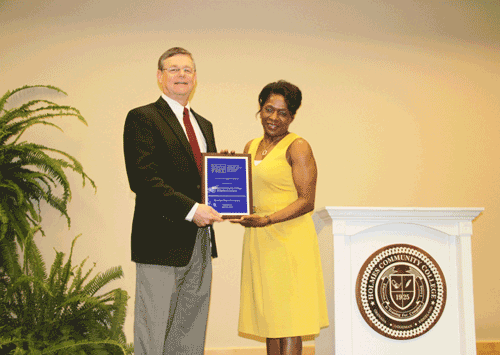2911Views
When Gracie Gustafson sat in her calculus class at the University of Alabama in Huntsville, where she was pursuing a degree in aerospace engineering, she had a sudden realization: “I don’t like working on computers, and I’d rather work with my hands.” That moment led her to shift gears and become the first female electric lineman at Holmes Community College – a career path that would take her far from the desk and into an industry traditionally dominated by men.
Born and raised in Grenada, Gustafson has always been an athlete. From the time she was 3 years old, she was playing soccer, a sport that became her number one love. In high school, she also played softball and kept active over the years with jujitsu, boxing and CrossFit.
“I’ve always been into physical activities,” Gustafson said. “Nowadays, I get my workout through lineman work.”
After graduating from Grenada High School, her athleticism took her to Itawamba Community College, where she played soccer, followed by a stint playing at Jones College and finally, playing at the University of Alabama in Huntsville. It was during a class at UAH that she had her epiphany: aerospace engineering wasn’t her passion. Though she was a good student, who had a 29 on her ACT, the classroom was not her favorite place to be. She wanted something hands-on, a career that wouldn’t tie her to a computer screen.
“I looked up the top five highest-paying jobs that don’t require a college degree, and electrical lineman was on the list,” she recalled.
That search led Gustafson to the Holmes Goodman Campus, where she’s now the first female student in their electrical lineman program, and only the second female lineman student in Mississippi overall.
“I researched various programs, and I can assure you, Holmes without a doubt had the nicest equipment and facilities, and was also the most organized,” Gustafson said. “It was my number one choice.”
The program lasts 16 weeks and offers students fundamental hands-on training. While enrolled, they earn a Class A commercial driver’s license, knowledge of the Electric Safety Code, as well as Occupational Safety and Health Administration (OSHA) standards and rules pertaining to the various types of utility providers they could potentially find employment with. Additionally, the students learn how to operate heavy machinery used in line work, CPR training and first aid and pole-climbing skills. Holmes’ electrical linemen program only accepts 14-16 students per semester and it is a very competitive entry process.
“The instructors for this program, Mr. Kenny and Mr. Lamar, they’re just wonderful,” Gustafson said. “They’re great teachers, full of knowledge. They hold you steady and let you know when you make a mistake, but in a way that you can learn from. It’s the perfect balance.”
While the physical demands of the job can be daunting, Gustafson isn’t fazed.
“The guys might be faster and stronger, but I’m able to do it,” Gustafson said. “It’s hard for all of us, if I’m being honest, but we’re well trained. For other girls interested in this line of work, I say go for it, if it’s what you want to do! You may not be as strong as the guys, but you can be as smart, and you can do this. Personally, I like being different, and being an inspiration to those who think women can’t do it because it’s a male-dominated field.”
Her family has been supportive throughout this unconventional journey. Gustafson is the daughter of Crystal and Jason Gustafson, and the sister of Brady, 15.
“It’s funny, my brother is the computer whiz in the family, and loves coding, so I used to get him to help me with those classes,” Gustafson said. “He’s the computer whiz in the family, and I’m the blue collar worker!”
Gustafson’s hard work has paid off, as she has already had interested prospects reach out to her about interviews for job opportunities.
To learn more about the Holmes linemen program, contact Workforce Coordinator/Director of the Attala Center Mandy Burrell at mburrell@holmescc.edu.
###


